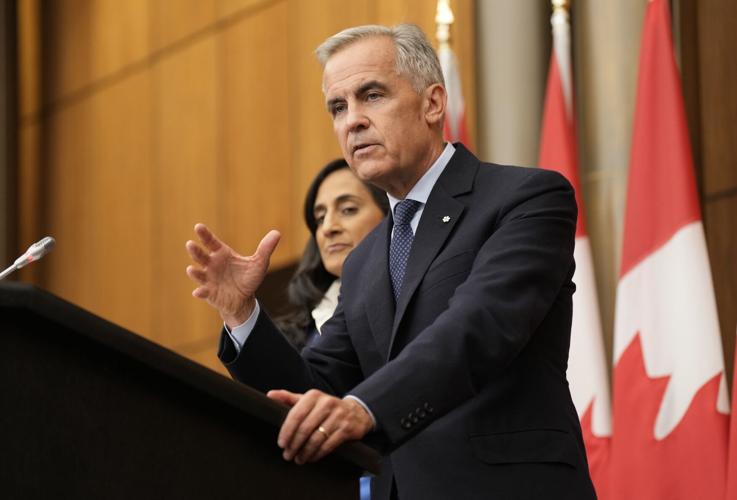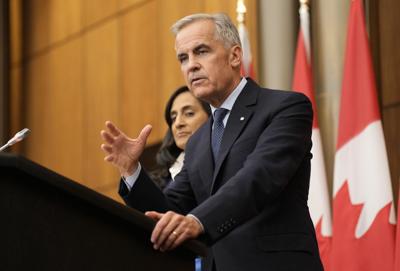OTTAWA ŌĆö Canada has no specific demands for the Palestinian Authority to meet in order to recognize the State of Palestine at September’s UN General Assembly, the PA’s most recent top official in Ottawa says, but reforms to achieve statehood are “not going to happen overnight.”
Echoing Prime Minister Mark Carney’s remarks Wednesday, Mona Abuamara, the PA’s Ambassador to Italy and formerly the chief representative in Canada for the last four years, told the Star in an interview that the conditions laid out by Ottawa to recognize a Palestinian state are in fact the goals of the Palestinian Authority that were communicated to Canada and other nations.

Mona Abuamara, the Palestinian Authority’s ambassador to Italy and formerly the chief representative in Canada for the last four years.
Justin Tang/The Canadian Press file photo“It’s not that it’s asked of us and pushed on us,” Abuamara told the Star Thursday. “Those are things that we want to have, because we want to build a state that’s independent and viable, democratic, and we want to be able to have our people choose their leadership.”
“It wasn’t preconditioned recognition. It was mutual agreement on the things that we’re on the same page.”
In making those comments, Abuamara shed further light on the process leading up to Canada’s decision this week to recognize a Palestinian state, but she also laid bare the challenges ahead to actually achieve a viable Palestinian state in the face of Israeli and Hamas resistance.
Speaking to reporters Wednesday, Carney expressed little doubt Ottawa would follow through in September, saying Palestinian Authority President Mahmoud Abbas repeatedly committed to elections in 2026, the exclusion of Hamas and the demilitarization of a future Palestinian state.
But Abuamara, who said the Canadians don’t expect any results by September, acknowledged following through on those reforms will be an uphill climb, and will require a massive international effort.
“It’s not going to happen overnight,” Abuamara said. “We have Gaza that has been levelled to the ground, and we have a Jerusalem that’s occupied. So those things we will need to have been resolved by the international community, so we would be able to have an election in Palestine.”
In announcing Canada’s plan to recognize a Palestinian state, Carney on Wednesday spoke of how prospects of a negotiated two-state solution have increasingly dimmed amid Israeli settlement expansion and settler violence in the West Bank, the Hamas attacks on Israel and Israel’s ensuing invasion of Gaza. Since the Oct. 7, 2023 attacks by Hamas, which killed more than 1,200 people and captured more than 250 hostages, Israel’s military response has killed more than 60,000 Palestinians, according to health officials in Gaza.
On top of those conditions, the Palestinian Authority, the main alternative leadership to Hamas, has been rife with allegations of corruption and deep mistrust among Palestinians, dampening its international reputation.
But amid little progress on a ceasefire and escalating outrage over the mounting death toll, the mass starvation and humanitarian catastrophe in Gaza, several nations are attempting to revive momentum for a two-state solution. That’s what compelled France and Saudi Arabia to hold a joint UN conference on the topic, and what later led Paris, the U.K., Ottawa and others to announce plans to recognize a Palestinian state led by the PA.
The current Israeli government, however, rejects a two-state solution.
Declaring “Israel will not bow to the distorted campaign of international pressure against it,” Iddo Moed, Israel’s ambassador to Canada, said Wednesday there is no reason to trust the Palestinian Authority and argued the move will harden Hamas during ceasefire and hostage negotiations, a view shared by the United States.
“President AbbasŌĆÖs latest vision for┬Āthe┬Āfuture sharply contrasts with the Palestinian AuthorityŌĆÖs long-standing record; thus, it is hard to see┬Āhis┬Ānew-found┬ĀŌĆścommitmentsŌĆÖ┬Āas┬Āmore┬Āthan┬Āa┬Āthinly┬Āveiled┬Āstrategy┬Āto┬Āmaintain┬Āthe┬Āstatus┬Āquo with the sympathy and support of the international community,” Moed said. “Canada and its allies should not be under an illusion otherwise.”
Thomas Juneau, a University of Ottawa professor who specialized in the Middle East, said that without a change in government in Israel, it’s unlikely the conditions for a two-state solution will be met.
“Everybody is careful in talking about that, because ... Canada and other countries don’t want to be seen as directly intervening in Israeli affairs,” Juneau said. “But everybody knows that this current government, given its makeup, is not interested in a two state solution.”
Likewise, purging Hamas, which rules Gaza, out of Palestinian society is also a tall order, said Louise Blais, a former Canadian representative to the UN.
“Hamas is an idea, as well,” Blais said. “And it’s going to live on in the people.”
Error! Sorry, there was an error processing your request.
There was a problem with the recaptcha. Please try again.
You may unsubscribe at any time. By signing up, you agree to our and . This site is protected by reCAPTCHA and the Google and apply.
Want more of the latest from us? Sign up for more at our newsletter page.




























